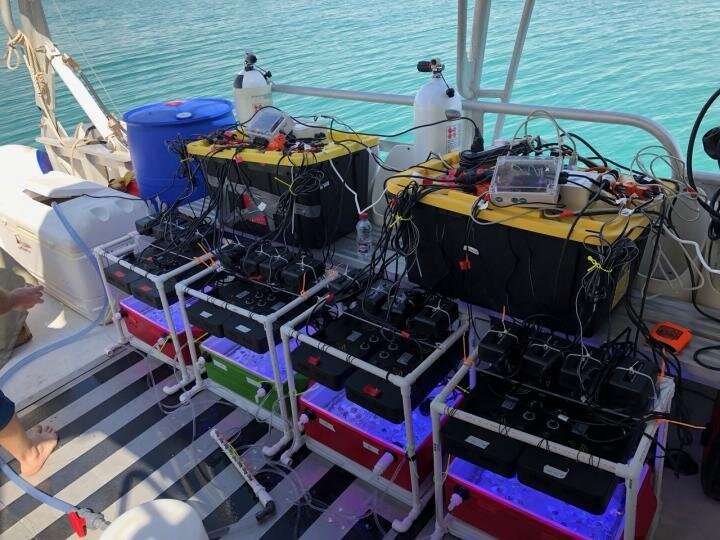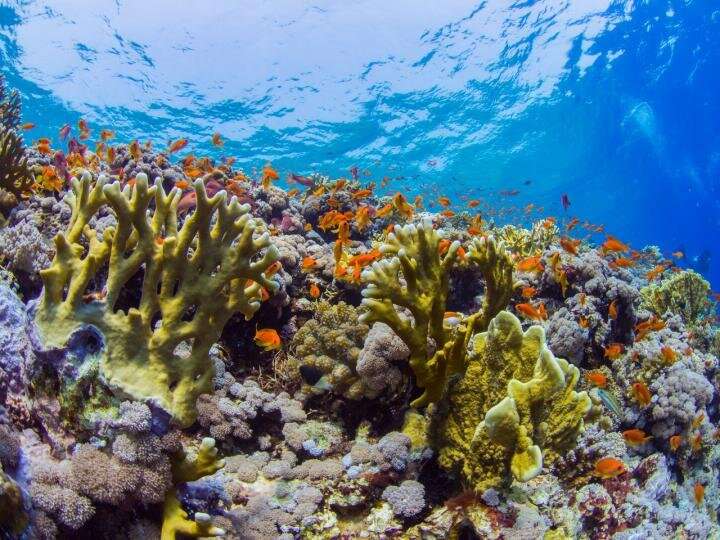Researchers develop mobile rapid test to assess coral thermotolerance

Coral death is impacting oceans worldwide as a consequence of climate change. The concern is that corals cannot keep pace with the rate of ocean warming. In particular, because a temperature increase of only one degree Celsius can make the difference between healthy and dying coral reefs. Some corals, however, are more resistant to increasing temperatures. In order to effectively protect coral reef habitats, it is important to identify which corals and reef sites are more resistant and thus have a greater chance of survival.
For this purpose, the research team led by Konstanz biologist Professor Christian Voolstra developed a rapid stress test to assess coral thermotolerance. The "Coral Bleaching Automated Stress System" (CBASS) makes it possible to assess coral thermotolerance on site and within a single day—much faster than current experimental procedures that typically take several weeks to months in a laboratory. A description of the test and a demonstration of its utility to resolve thermotolerance differences between close-by reef sites was published as an online-only article on 21 June 2020 in the journal Global Change Biology.
The test system is highly mobile, can be deployed on boats, and is straightforward to use: Corals are placed in test boxes at the location where they were collected and then subjected to thermal exposures at different temperatures—a type of stress test for the corals. Using a standardized procedure, researchers can then record the results and compare how different corals react to the same set of temperature exposures.

The advantage of this test method is its standardization: By comparing results from a single experiment with data collected from many corals worldwide, it is possible to obtain an accurate assessment of the thermotolerance of the corals under study. "The basic principle is that of an electrocardiogram stress test: by measuring the heart's ability to respond to external stress in a controlled environment and subsequent comparison to the results of millions of others, one can make detailed projections of the individual patient's health without the need for detailed examinations," Christian Voolstra explains. The same applies to the stress test for corals: The standardized procedure provides a picture of the state of the coral tested and enables researchers to assess their thermotolerance without the need for complex and lengthy laboratory evaluations.
"We focused on building the test boxes with materials that are available in almost any hardware store or shop selling aquarium equipment. We want these test boxes to be used widely and this is why we made all instructions for setting up the tests as well as our results and evaluation methods freely available," says Professor Christian Voolstra. The test boxes feature common aquarium heaters, lights and coolers in order to simulate the necessary temperatures and lighting conditions.
Since this test system is so readily available, it can support the creation of a global map of the state of coral reefs.
Getting a global overview of coral thermotolerance could form an important basis for decision-making to save coral reefs: "We unfortunately won't be able to save all coral," Voolstra regrets, "So we want to concentrate our efforts on the corals and reef ecosystems with the highest chance of surviving climate change," he adds.
More information: Christian R. Voolstra et al, Standardized short‐term acute heat stress assays resolve historical differences in coral thermotolerance across microhabitat reef sites, Global Change Biology (2020). DOI: 10.1111/gcb.15148
Instructions for building the stress test boxes as well as access to all associated data and analytical pipelines are freely available online from: github.com/reefgenomics/CBASSvsCLASSIC
Journal information: Global Change Biology
Provided by University of Konstanz





















